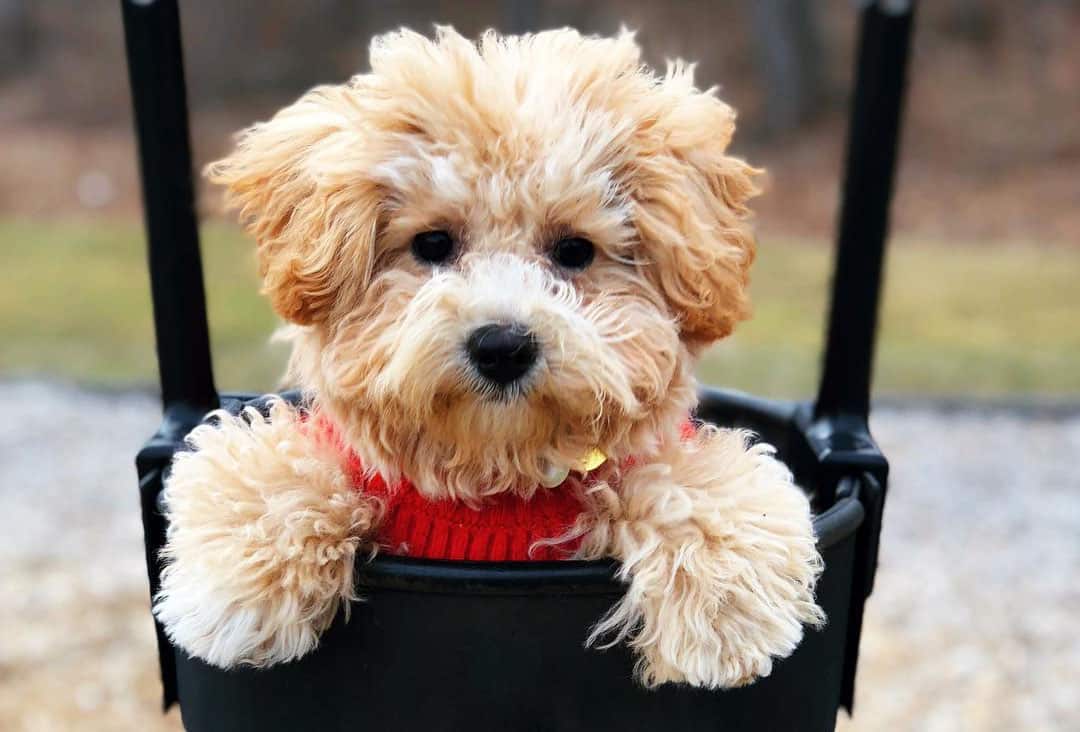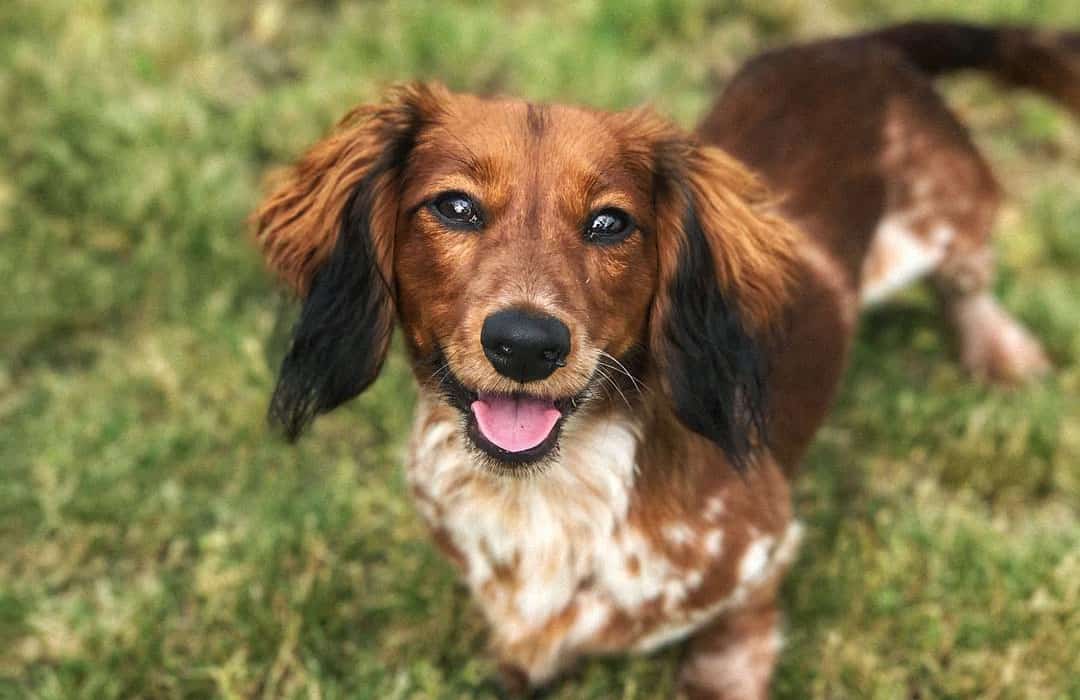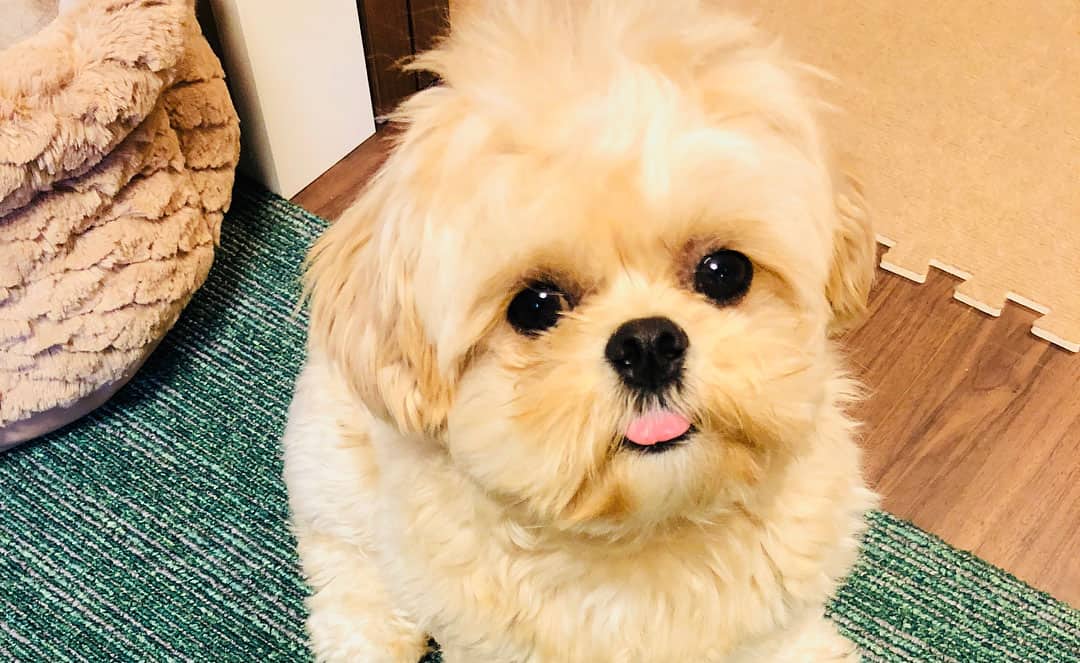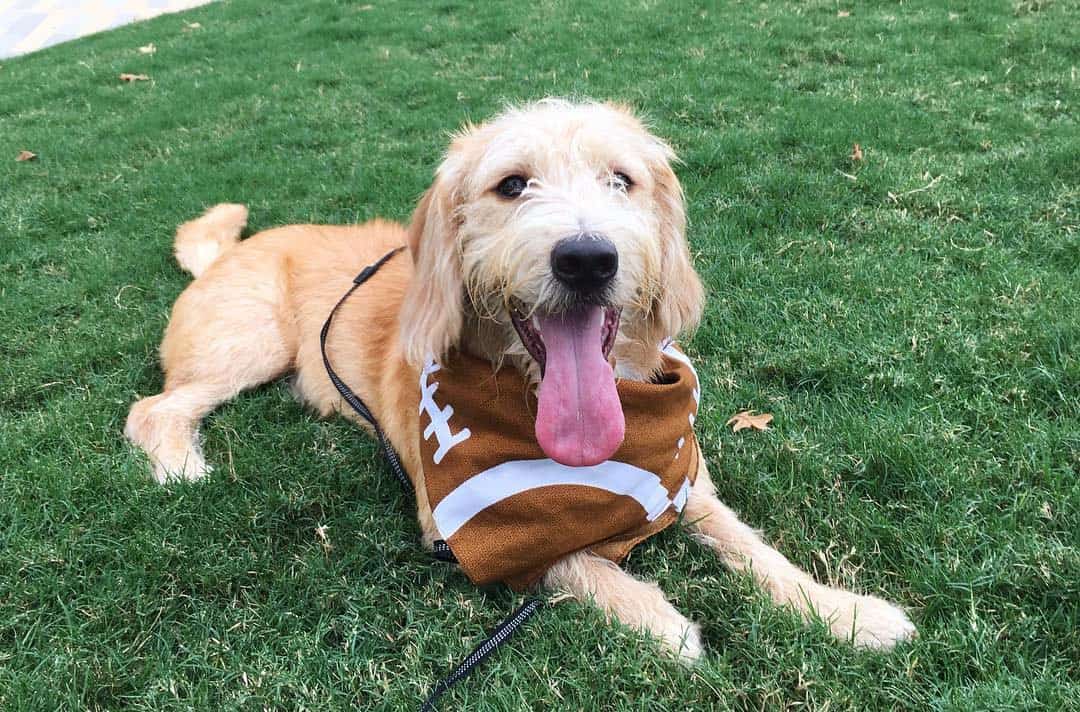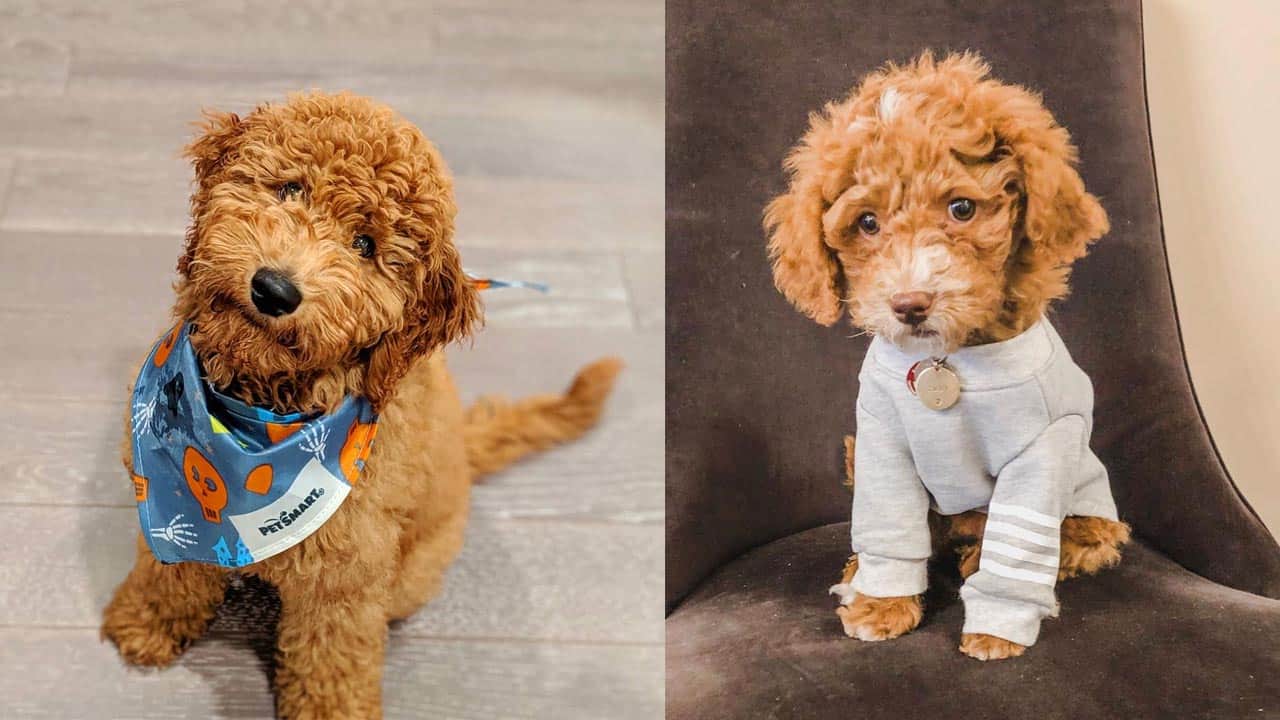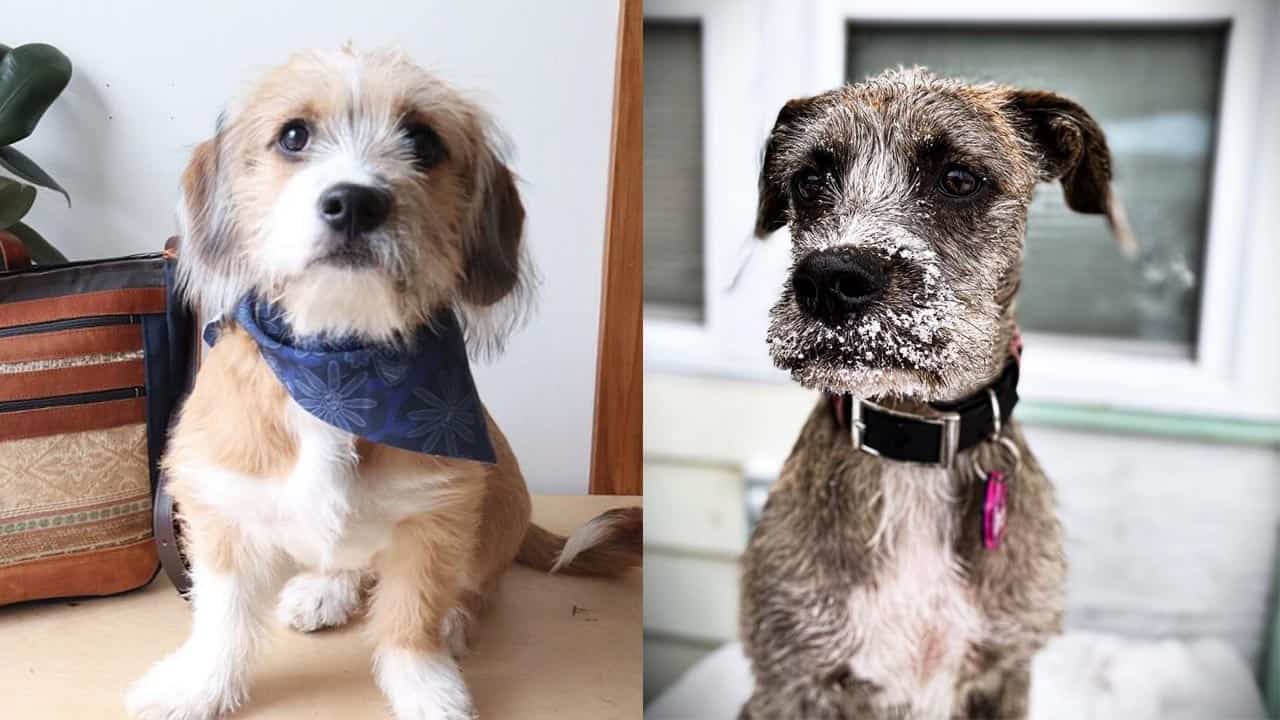You might wonder if an F1B Goldendoodle is the right dog for you.
After all, this pup is a mix of two purebred dogs, the Golden Retriever and the Poodle. So what can you expect? Well, let’s take a closer look.
The progeny of an F1 Goldendoodle backcrossed with either a purebred Golden retriever or a purebred Poodle is known as F1B Goldendoodles. An F1B Goldendoodle puppy would be 75% Poodle and 25% Golden Retriever.
Because of this, F1B Goldendoodles are often recommended for families with allergies, as they are low-shedding dogs. They’re also great for people who love to exercise, as Goldendoodles are very active dogs.
What Is an F1B Goldendoodle?
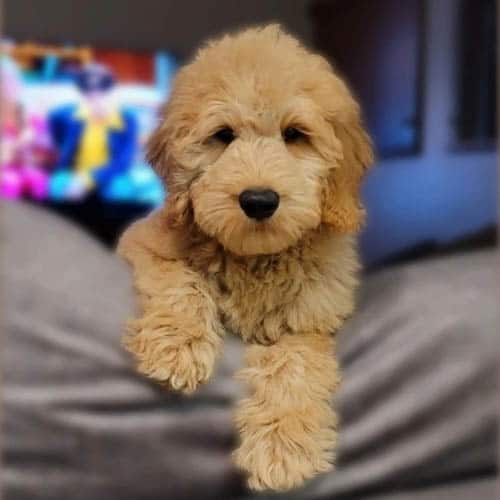
The progeny of an F1 Goldendoodle backcrossed with either a purebred Golden retriever or a purebred Poodle is known as F1B Goldendoodles. An F1B Goldendoodle puppy would be 75% Poodle and 25% Golden Retriever.
Now that we’ve got that out of the way let’s talk about why an F1B Goldendoodle might be the right pet for you. First of all, they’re incredibly friendly and social dogs. They’re often used as service dogs because of their gentle nature and easygoing temperament.
Another great thing about F1B Goldendoodles is that they don’t shed a lot, which makes them a good choice for people who suffer from allergies. And finally, they’re just plain adorable, which is always a bonus!
What is an F1 Goldendoodle?
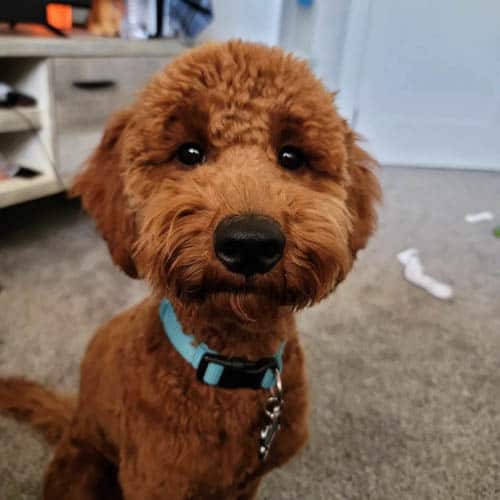
The word “Filial” denotes a crossbreed rather than a purebred dog, so let’s start there. Every Goldendoodle variety will have the letter “F” in its generational name because each one is a hybrid dog that the breeder produces by mating a Poodle with a Golden retriever. The puppies are the first generation born from a Poodle and a Golden Retriever, as indicated by the number “1” in their names.
Every puppy will have a somewhat distinct appearance and attitude, as with other hybrid animals, depending on which of the parent’s genes are dominant in that specific pup.
The F1 variety of Goldendoodles is among the most well-liked multigenerational varieties. But the primary issue with crossbreed dogs is that each youngster will differ slightly in appearance and temperament. In other words, even though F1 Goldendoodle puppies have 50% of each parent’s genes, no two will be identical.
The dominant gene(s) from each parent dog will determine the characteristics of each pup, even though the puppies share 50% of each parent dog’s genes. You don’t know, for instance, if your puppy will have a straight, curly, or wavy coat or how hypoallergenic the adult will be. Additionally, until the puppy is fully grown, you cannot predict the color of its coat.
The coat of a Poodle with dominant genes is curly or wavy. An F1 Goldendoodle puppy that largely resembles the Poodle parent will be more hypoallergenic than one with more dominant Golden retriever DNA because purebred Poodles don’t shed. Poodles are thought to be more clever than Golden retrievers, who are typically seen as highly loving and devoted.
All puppies from the F1 Goldendoodle generation have what is known as Hybrid Vigor, one of their best qualities.
Hybrid vigor indicates that mixed-breed dogs are typically healthier than purebreds. The same hereditary abnormalities are passed down the genetic line to the kids when purebred dogs are continuously inbred to preserve the purity of the genetic line. Therefore, severe physical issues, including hip dysplasia and PRA, are prevalent.
Only genetic flaws present in the Poodle and Golden retriever can be passed on to the puppies in F1 Goldendoodles. Reputable and ethical breeders only use male dogs who have undergone health screening and are free of such inherited disorders to prevent that from happening. A breeder should ideally be able to show that the parents and grandparents of their stud dogs also passed health screening exams with flying colors.
What Does F1B Mean?
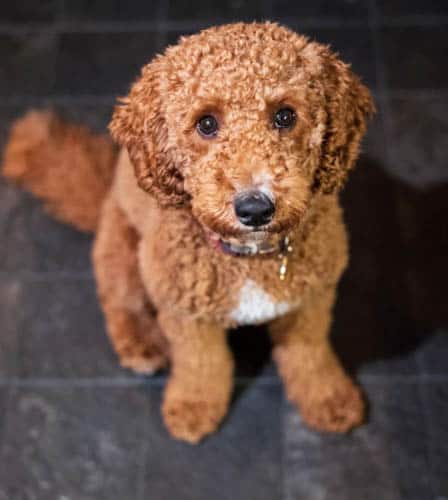
The letter “B” stands for Backcross; thus, as you might think, F1B indicates the same as F1, except for adding the letter. Backcross refers to the F1 dog’s mating with a parent purebred breed.
Therefore, “F” still stands for filial, indicating that the dog is a crossbreed, and figure “1” designates that the animal is a Golden retriever and Poodle puppy of the first generation.
F1 vs. F1B Goldendoodle
F1 Goldendoodles typically have three coat types: wavy, straight, and curly. Their coat can be hypoallergenic depending on their genetic makeup, and they shed moderately. F1B Goldendoodles, on the other hand, only have two: wavy and curly. Their coat is always hypoallergenic, and they shed very lightly.
F1 Goldendoodles are intelligent and eager to please their owners but can sometimes be stubborn. F1B Goldendoodles are highly intelligent and very trainable.
Both are very loyal, loving, affectionate, and equally adorable!
What Are the Benefits of an F1B Goldendoodle?
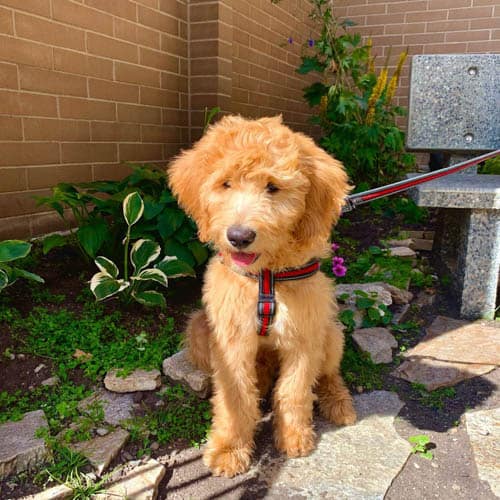
You might be wondering what the benefits of an F1B Goldendoodle are. Let us count the ways!
First of all, they’re incredibly intelligent and easy to train. So if you’re looking for a pup who’s going to be a quick learner, an F1B Goldendoodle is the way to go.
They’re also incredibly friendly and love human interaction. They can’t stand to be alone for too long, so they make great companions. Plus, they have a really sweet personality and are always happy to please.
Are There Any Drawbacks to an F1B Goldendoodle?
They’re the perfect mix of Golden Retriever and Poodle, which means they’re incredibly smart and have that signature Goldendoodle personality that everyone falls in love with. But one thing to consider before you run out and adopt one of these puppies: F1B Goldendoodles are a bit more sensitive to certain health problems than their F1 or purebred cousins.
So if you’re not prepared to deal with allergies, digestive issues, or hip dysplasia, an F1B Goldendoodle may not be the right pet for you.
What Are the Personality Traits of an F1B Goldendoodle?
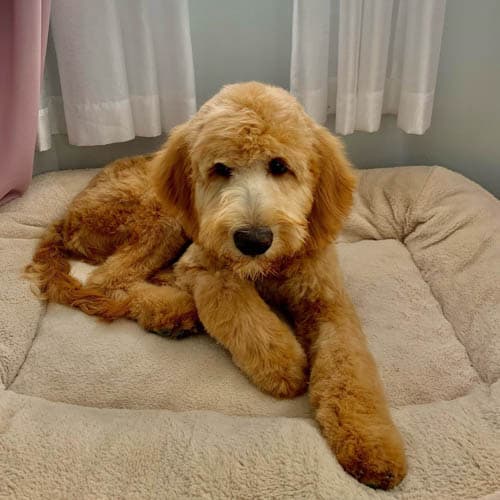
You might be wondering what the personality traits of an F1B Goldendoodle are. Are they as friendly and lovable as an F1 Goldendoodle? Let’s take a closer look.
First, F1B Goldendoodles are bred hypoallergenic, which is a big plus if you or someone in your family is allergic to dogs. They’re also highly intelligent and easy to train, which is great if you’re looking for a pup that can be a loyal companion and help out around the house.
F1B Goldendoodles tend to be on the smaller side, so they’re a great choice if you’re looking for a compact dog that doesn’t take up too much space. And with their wavy coat, they’re bound to look adorable no matter what they’re doing.
How Do I Care for an F1B Goldendoodle?
So you’re thinking of getting an F1B Goldendoodle? Great decision! These dogs are amazing companions and make perfect pets. But before you bring your new pup home, there are a few things you need to know about taking care of him.
First, Goldendoodles need plenty of exercises, like a good long walk daily. They also need plenty of playtimes, so set aside time for that each day.
Second, Goldendoodles require a lot of attention. They’re very social dogs and love to be around people. So if you’re not home a lot or work long hours, this might not be the right dog for you.
Third, Goldendoodles need proper training. They can be mischievous and need to be taught the basics—like coming when called and not jumping on people—so they can be good family members.
If you can commit to providing your F1B Goldendoodle with the love and care he needs, then he’ll be the best friend you’ve ever had.
What Are Some Common Health Problems With F1B Goldendoodles?
So you’re thinking of getting an F1B Goldendoodle? That’s great! They’re such a popular breed for a reason. But before you make your final decision, it’s important to be aware of some of the common health problems associated with this breed.
For starters, F1B Goldendoodles are prone to hip and elbow dysplasia. They can also suffer from allergies, skin problems, and ear infections. And because they’re a mixed breed, it’s hard to predict what health issues your puppy might inherit from its parents.
That’s why finding a reputable breeder who does health testing on their dogs is so important. They should be able to provide documentation proving their dogs are free of genetic health problems. You should consider finding another breeder if they can’t do that.
How Do I Train an F1B Goldendoodle?
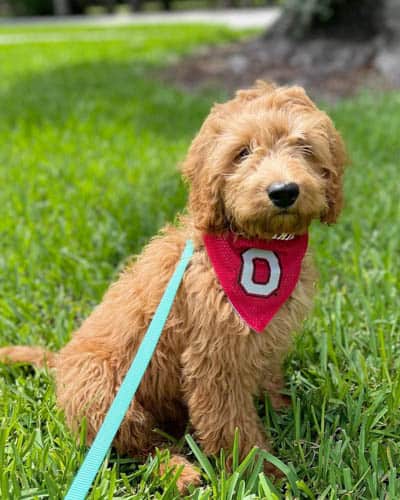
When it comes to training your F1B Goldendoodle, there are a few things you need to remember.
First of all, puppies are always going to be puppies, no matter what their breed is. So you need to be patient and consistent with your training. Remember, getting your dog to understand what you’re asking of him will take time and patience.
Also, it’s important to start training your puppy early. The sooner you start, the better. Puppies learn best when they’re young and love pleasing their owners. You can make training fun for both of you by using positive reinforcement—like treats and praise—instead of punishment.
So if you’re ready for the rewarding challenge of training an F1B Goldendoodle, get started today!
Fast Facts
Before we end this article, let’s review everything we’ve learned about double F1B Goldendoodle Dogs.
Appearance
Based on the variety of coat colors of the Poodle– like black, white, cream, and apricot– and the range of shades of golden the Golden Retriever heritage brings to the mix– like golden, lightly golden, and dark golden– the F1B Goldendoodle can sport a variety of colors. An F1B Goldendoodle’s coat color may be cream, apricot, red, black, chocolate brown, parti, and merle.
Given that they can be found in various sizes providing a precise height and weight reference for the Goldendoodle might be challenging. There are three sizes available for the actual Poodle: standard, miniature, and toy. Even the tiniest of the four sizes, known as a teacup poodle, exists. The size of an F1B Goldendoodle will ultimately rely on the sizes of its parents. Therefore, search for smaller parents if you want a smaller dog and vice versa.
Temperament
F1B Goldendoodles are ideal family dogs since they get along well with kids and are quite sociable. They show affection for one another and cherish family time. Since they like to please others, they are very simple to train.
The F1B Goldendoodle will not disappoint you if you’re looking for an affectionate dog. The breeds from which this dog originates are friendly and have no concept of strangers. They undoubtedly possess what is frequently regarded as a dog’s ideal temperament.
Lifespan
F1B Goldendoodles usually live for up to 10-15 years.
Diet
You should feed an F1B Goldendoodle the best food you can manage. The best dog diets have completed feeding trials, were developed by a veterinary nutritionist, and adhere to AAFCO requirements. The typical daily dry food need for larger F1B Goldendoodles is two to two and a half cups. However, depending on whether or not your dog’s weight changes, you can change the amount.
Lifestyle
Many Goldendoodles are quick to learn, energetic, and ready to please. They require energy burns and mental stimulation. They need attention and like to be part of the pack. They are often recommended for families and make wonderful companions.
Like all dogs, if they don’t get enough mental stimulation or physical activity, they may find outlets for their excess energy, like stick chewing and digging. In addition, Goldendoodles are social dogs that, if left alone for extended periods, may exhibit signs of anxiety or boredom. They may be pushy, mouthy, want to chew on everything, or zoomy as puppies.
Shedding
The breed a doodle takes after more—the Poodle or the golden retriever—determines how much hair it sheds. You can anticipate the F1B to shed more if its mom is an F1 doodle mixed with a purebred golden retriever. However, there is a greater likelihood that the coat will resemble the Poodle’s coat if the purebred parent is a poodle. In this situation, the doodle would not shed much and maybe a decent choice for someone with allergies who wants to keep a dog.
Grooming
An F1B Goldendoodle will have a coat type that falls somewhere between the Golden Retriever and the Poodle when it comes to shedding, but the Goldendoodle will still require regular grooming and brushing because they have a high shedding coat.
Frequently Asked Questions
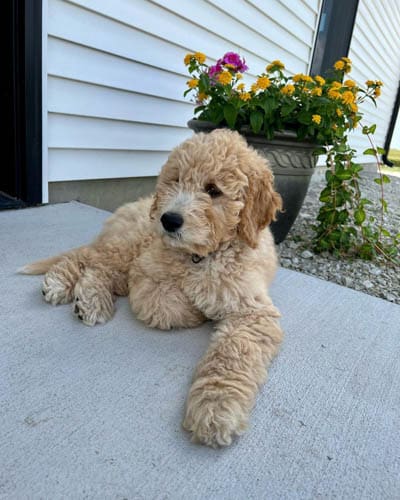
Do Double Doodles make good service dogs?
F1B Goldendoodles make an amazing service dog because they are smart, obedient, and eager to learn– which are traits that all service dogs must have.
F1B Goldendoodles also excel as psychiatric service dogs and emotional support animals because of their ability to sense someone’s emotions and stellar observation skills. They’re also fantastic therapy dogs because of their friendly and open nature.
Are they good with kids?
F1B Goldendoodles are generally a great choice for families with kids. They are very friendly, energetic, and playful– making them the perfect playmate for children with as much energy. They tend to be gentler and more tolerant, but it’s still important to supervise them while playing with small children.
However, if you choose to get a small version of the F1B Goldendoodle, like the toy or teacup size, keep in mind that this dog size may be prone to injury or accidentally stepped on by children.
Are they good with other pets?
We wouldn’t recommend F1B Goldendoodles to people who enjoy keeping small pets such as rabbits, guinea pigs, or hamsters since these types of pets are considered prey animals. The Goldendoodle was created by crossing two hunting breeds – the golden retriever and the Poodle. If you do have small pets, make sure to keep them at a safe distance. But they do well with other dogs and even cats.
Conclusion
We hope this article will guide you and provide you with all the information you need to make an informed decision about whether or not a double doodle is right for you. If you’re looking for a lovable, intelligent, and goofy dog, the F1B Goldendoodle is the perfect breed! These dogs are loving, social creatures that make great family pets.
F1B Goldendoodles are the perfect mix of Golden Retriever and Poodle, making them gentle, intelligent, and easily trainable dogs. They’re great with kids and make perfect pets for families or anyone needing a loyal friend.
